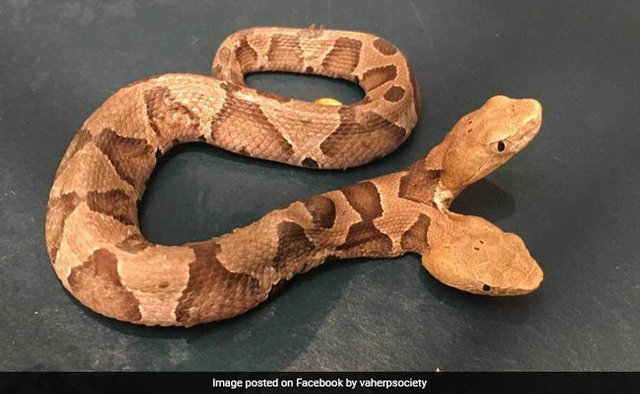Two-Headed Copperhead Snake Found In US, Scientists Take A Closer Look

Imagine trying to eat if you had two heads and mouths to feed on one body.
Such was the dilemma for a two-headed copperhead snake recently discovered in a yard in Woodbridge, Virginia.
The snake was found a week ago, and pictures of it were sent and posted to Facebook of a wildlife expert.
Such two-headed snakes are "exceptionally rare," mainly because they don't live that long, a Virginia herpetologist JD Kleopfer said on Facebook.
The snake was caught and taken to a wildlife expert with experience in breeding and raising vipers, officials said. Copperheads are venomous.
But herpetologists got a chance to look at it and make some observations on the rare find. A video shows it slithering along a rock.
In his Facebook post, Kleopfer said the left head had the more dominant esophagus and the right head had a more developed throat for eating.
The left side, herpetological experts said, was "generally more active and responsive to stimulus."
After doing radiographs, experts found that the two-headed snake has several other unique features. The snake has two heads but one heart and one set of lungs.
"Based on the anatomy, it would be better for the right head to eat, but it may be a challenge since the left head appears more dominant," experts at the Wildlife Center of Virginia said in a news release.
Kleopfer said officials hope the rare snake will eventually be donated to a zoo and put on exhibit.
Rich Perry, who runs a wildlife removal company - Virginia Wildlife Management and Control - said he helped identify the snake. Perry said the woman found the snake in her front yard near a bush and "had no idea what it was."
"She was afraid it would get away and having kids and pets, they were going to get bit," Perry said. She scooped it up in a plastic bin, according to Perry, took a picture and posted it to her neighborhood list serv group, asking if anyone could identify it.
Someone on that group saw the picture and sent it to Perry, who runs a 24-hour hotline that helps identify snakes. When he saw it, Perry said, he knew it was a venomous copperhead.
"It was absolutely incredible," Perry said. He said he deals with "hundreds of snakes every year" during his 40 years in the wildlife removal business for but has never seen anything like this.
"It was a fluke thing. Just a freak of nature," Perry said.
The homeowner did not wish to be identified, according to Perry. On Monday, Perry said at least six people, including the owner of a private museum, said they would pay for the two-headed snake because it is so rare.
One problem for two-headed snakes: They fight.
Gordon Burghardt, a herpetologist at the University of Tennessee, told National Geographic that two-headed snakes will often fight over which head swallows the prey.
Eating can take time for the snake and experts said that leaves them vulnerable to predators.
Not to mention the trouble of deciding which way to go. They often can't respond quickly when they are attacked.
In Louisiana about a year ago, Tanee Janusz was given a two-headed Western rat snake found by a friend. A master naturalist, Janusz kept the snake and named the two heads Filo and Gumbo, according to Newsweek.
Janusz said she has to take extra care of the two-headed snake by making sure its water bowl isn't too deep - otherwise, one head can drag down the other.
Experts said two-headed snakes are like human conjoined twins in that it happens when an embryo starts to divide into identical twins but stops. It is possible to separate two-headed snakes, which can learn to be independent, experts said.
In the Eastern region, the two-headed copperhead wasn't the only snake that wildlife specialists have dealt with recently. On Sunday night, they also helped get a copperhead out of a garage in Richmond where it was hiding behind a storage bin.
And in Maryland, a resident in Rockville was bitten by a copperhead Saturday while gardening. Emergency responders who helped treat the resident said it was a "dry bite," which snake specialists said is one in which no venom is injected.
With heavy amounts of rain this spring and summer, snakes have been on the move and looking for dry areas, experts said.
Earlier this month, a student at a Maryland elementary school found a snake in her desk. It was a three-foot blacksnake and was moved to a nearby woods.
COMMENT
And in Washington's Georgetown neighborhood, a city library was closed for more than two days after several live snakes were found inside. Library workers said the snakes were likely garter snakes - a harmless snake that is common in the region.